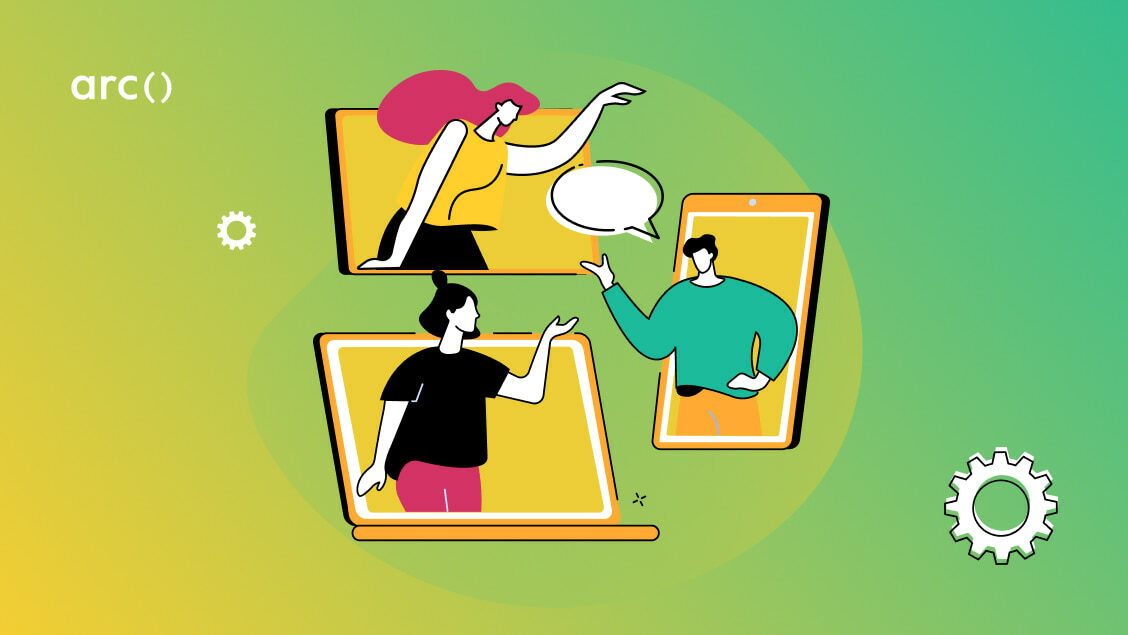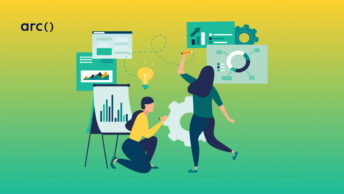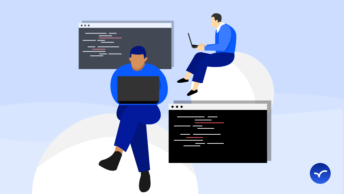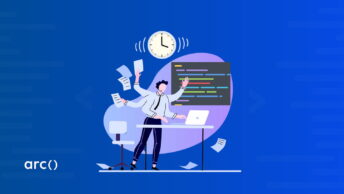What skills do you need as a software developer?
The programming languages you know, your coding skills, and the skills needed to architect and implement applications are probably the first things that come to mind. So, in other words, technical or hard skills.
But it’s easy to forget about the soft skills needed to be a software developer. These include anything from problem-solving and analytical abilities to leadership and critical thinking skills, among others.
Some of the most important soft skills you could have, however, are interpersonal skills. It’s these skills that allow you to effectively communicate with teammates, clients, and other stakeholders. And, as you know, all these are crucial in your job as a software developer.
But what are interpersonal skills, why are they important, and, more importantly, what can you do to improve yours? Let’s look at these questions in more detail.
Find your dream remote job faster with Arc.
- Development, design, and marketing roles
- US-based startups and tech companies
- Choose freelance or full-time remote work
Work from anywhere in the world on your terms.
Join Arc now →
What are Interpersonal Skills?
Let’s start by looking at what interpersonal skills actually are.
Interpersonal skills are the skills someone relies on when they interact and communicate with other people, including friends, family, and colleagues. It’s for this reason that you’ll often hear them being referred to as “people skills” or “life skills.”

Interpersonal skills examples
Maybe the best way to illustrate these people skills in more detail is by looking at some examples of effective interpersonal skills.
Emotional intelligence
Emotional intelligence is your ability to be aware of and manage your emotions — as well as the ability to perceive and deal with the emotions of others, both on an individual level and in groups. Generally, when you have higher levels of emotional intelligence, you’ll be able to manage your emotions and deal with stress easier. And what software developer doesn’t have stress, right?
But emotional intelligence doesn’t stop with managing stress and emotions better, though. It also includes a subset of skills that include empathy, self-awareness, self-regulation, and motivation. And some of these are especially important for software developers.
For example, empathy is all about understanding other people’s problems and putting yourself in their shoes. Conversely, software development is about solving people’s problems. So, with empathy and the ability to understand people’s problems better, you’ll be able to find better solutions to them. Ultimately, this allows you to build better software.
Moreover, as you know, in software development, you’ll continuously strive to improve your skills both on a personal and professional level. With higher emotional intelligence, you’ll have more self-awareness which means you’ll be able to identify your shortcomings better. And if you’re able to do this, you’ll be able to implement the necessary strategies to improve.
Read More: How to Build a Software Engineer Portfolio
Communication
Communication skills can be broadly divided into three distinct categories:
- Verbal communication. Verbal communication relates to what you say and how you say it. This is often the foundation of effective communication and getting your message across to other people.
- Non-verbal communication. Effective communication doesn’t stop with verbal communication, though, and non-verbal communication is just as important. Here, your gestures, tone of voice, and body language can reinforce the message you’re trying to communicate or, in some cases, even undermine it.
- Listening. Communication doesn’t come only from one side of a conversation, right? That’s why listening skills are also crucial when it comes to communication skills. In fact, you’ll spend up to 45% of your time listening.
Now, it might be that, in the past, you wouldn’t have needed stellar communication skills as a software developer. It was simple: you got the tasks you needed to complete from your project manager, and off you went.
But modern software development is much more of a team affair that requires — yes, you guessed it — effective communication. Actually, some say that excellent communication skills are vital for a successful career in software development. And, let’s face it, when you have the communication skill chops, you’ll also be more approachable.
Apart from discussions with your team, you’ll often also need to communicate directly with clients. And when you do, you’ll need the right communication skills. These will let you not only listen to their issues and requirements, but also be able to distill complicated technical aspects into language that’s relatable and easy to understand. Projects progress more smoothly when everyone’s on the same page!
Teamwork
Teamwork is probably one of the most important skills you can have as a software developer. It involves the way you work with others in formal settings like meetings as well as more informal project chats.
In software development, it can relate to how you work as a team towards a common goal and how you collaborate. Thanks to project management methodologies like Agile, effective and efficient teamwork is a must-have.
Effective teamwork can increase:
- Efficiency. It’s simple, when team members work together effectively to reach a common goal, the entire team will be more efficient. As a result, they’ll be able to deliver quality software faster. This, however, also depends on effective communication and collaboration between team members.
- Creativity. When team members communicate and collaborate well, they’ll be more willing to share their ideas with the rest of the team. This, in turn, leads to more creativity and can improve the product they’ll deliver.
- Innovation. Flowing from increased creativity, is the ability to innovate more. Simply put, when teams are more creative, they’ll be able to find more innovative solutions to the problems their customers experience.
Ultimately, effective and efficient teamwork allows teams to develop better software and keep their clients satisfied.
Read More: Common Interview Questions for Software Engineering Jobs
Dependability and Responsibility
As a software developer, you’ll need to take responsibility for any new task you get. In other words, you’ll need to know what to do and by when. In turn, your colleagues, teammates, and other stakeholders should be able to depend on you to get the work done on time.
This means, in other words, you need to be reliable. Reliability means that when you take on new, often complex tasks, you see them through to completion, no matter how challenging they are.
Not only does reliability ensure that you, as a software developer, will deliver high-quality work within any agreed time limits, but it also makes you a valuable member of the team. And, let’s be honest, employers value dependable and reliable workers and trust them with their most important tasks and duties. This means, when you’re reliable, you’re more likely to be promoted.
Leadership
Leadership skills is a vital set of abilities to have, especially if you’re a more senior software developer. Why? You’re more likely to end up leading a team. Leadership typically consists of a subset of other skills that you use to effectively lead a team. These include skills like organizing, planning, risk management, and also decision-making and problem-solving skills.
Apart from these, to be an effective leader, you also need excellent emotional intelligence, communication, empathy, negotiation, and conflict resolution skills. With these skills in your arsenal, you’ll be able to effectively lead any team to deliver high-quality software based on a specific client’s needs and requirements.
But it goes further than this. Leadership is about more than just leading a team and taking charge. It also allows you to inspire and motivate your teammates to deliver their best work consistently.
Read More: Do You Need a Degree to Become a Software Engineer?
Negotiation and persuasion skills
Negotiation and persuasion skills are often thought of as a subset of communication skills but they’re so important that it warrants seeing them as separate interpersonal skills. This is especially true for software developers.
Let’s face it, if you put 10 software developers in a room and give them a problem to solve, you’ll likely find a lot of differing opinions and disagreements on the best way to solve the problem. And this is where effective negotiation and persuasion skills come in.
They’ll allow you to not only convince other team members on the best way forward but also allow you to find common ground where there are differences. This, ultimately, leads to finding the best solutions for a problem that takes into account every team member’s thoughts and proposals.
Apart from this, you’ll need effective negotiation and persuasion skills in many other aspects of life as a software developer. For instance, apart from convincing your team members about the best way to solve a problem, you’ll often have to do the same with a client.
These skills are also invaluable when you need to:
- Convince clients to make use of your services,
- Determine workloads and schedules within a software development team,
- When you’re applying for a software development position, or
- When you need to convince management that you should get a raise or promotion.
Conflict resolution skills
It’s a fact that negotiations won’t always work out well — and then you’ll have to deal with disagreements and conflict. This is not necessarily a bad thing, as differing points of view can lead to innovative solutions to problems and, therefore, better software. Unfortunately, it doesn’t always turn out this way.
And this is where conflict resolution skills become relevant. These skills help you positively resolve conflict while leaving valuable relationships intact. Conflict resolution skills generally include a subset of skills like mediation skills, the ability to communicate in difficult circumstances, and the ability to deal with feedback and criticism.
The last mentioned is especially crucial in software development as you’ll often get feedback or criticism on the code you write. Here, you’ll have to deal with this feedback effectively and often incorporate suggestions into your workflow.
If you don’t, you’ll more than likely appear unapproachable and not open to any suggestions to improve. Even worse, you could appear arrogant, and let’s face it, no one wants an arrogant software developer on their team. Conversely, if you’re able to accept constructive criticism and deal with feedback effectively, you’ll be more successful in your role as a software developer.
Read More: Best Resume Builders & CV Makers for Software Developers
Decision making
Now, you might immediately think that decision-making is not an interpersonal skill. After all, you make your decisions on your own and you have to deal with the consequences of your decisions.
The thing is, the decisions you make directly impact those around you. This is especially true when working in a team. Just think about it: you need to make decisions about the code you write, the features you include in a product, and how the team will work towards the goals among others.
To be a good decision-maker, you need to be able to effectively consider the advantages and disadvantages of every decision you need to make or the course of action you take. And you need to also take others’ viewpoints into account. Moreover, you need to be able to make tough decisions when you need to, despite potential criticism from your team.
Ultimately, in software development, a wrong decision can not only impact the success of the project but also how satisfied the client is with the outcome. And here, another vital aspect of decision-making comes into play. When making decisions, you also need to be accountable for them and face the consequences of any wrong decisions.
Work the way you want from anywhere in the world 🌎
Find top freelance and full-time remote jobs.
Learn more about Arc →
Important Tips & Strategies for Improving Interpersonal Skills
Now that we’ve seen some examples of interpersonal skills, and where you would typically use them as a software developer, let’s look at some ways you can improve these skills.
Set goals for yourself
The first step in improving your people skills is by setting concrete goals for yourself. Here, you’ll need to consider all your strengths and weaknesses carefully, and decide what specific skills you want to develop more. Based on these goals, you’ll then be able to implement the necessary strategies to improve.

What could be helpful is using SMART goals. This means setting goals that are specific, measurable, attainable, relevant, and time-sensitive. Not only does this improve your chances of reaching your goals but it also gives a way to track your progress.
Be clear
It’s vital that you focus on being clear in your communication to others, whether it’s verbal or non-verbal. It’s simple: when you’re clear when you communicate with a team member, client, or other stakeholders, you’ll eliminate the possibility of misunderstandings and you’ll be able to get your message across every time.
Give people context and background, structure your messages clearly, and include deadlines where relevant. Make your communications easy for others to understand, and reduce the burden on them! This is even more important during intercultural communication, such as on a distributed team.
Be willing to learn
One of the best ways to improve your interpersonal skills is to be open to learning from others. Remember, there’s something you can learn from almost all people you interact with, whether they’re a colleague, a client, or even management.
When you do, you’ll see how others communicate effectively, approach conflict, and deal with criticism. This can give you valuable strategies you can use to improve your interpersonal skills.
Read More: How to Become a Software Engineer: Education, Steps & Tips for Success
Be mindful of your language
It’s crucial that you be considerate of your audience in the language you use when communicating. This is simply because the way you communicate with different people will differ. For instance, you wouldn’t speak to a client the same way you would with a friend or family.
Likewise, you’ll likely explain complicated technical concepts to a colleague in a completely different way than you would a client.
Choosing your language wisely is also extremely relevant when you’re writing, for instance, an email. This is because, unlike with verbal communication, you aren’t able to see the addressee’s state of mind, so, in a sense, you’re unable to see how they’ll interpret your writing. This, in turn, can lead to unwanted conflict. Emojis can also be useful for signaling mood and intentions, especially in asynchronous or cross-cultural contexts!

Speak more, write less
You should aim to speak more and write less when communicating. Speaking will allow you to communicate clearly and use the right language as mentioned above.
Moreover, issues and conflicts can be sorted out far quicker and more effectively when speaking compared to writing. Think of it this way: when you speak to a teammate to sort out an issue, you can listen to and consider all their viewpoints and have the opportunity to state yours.
Although this is certainly possible when sorting out an issue through, for instance, email, it will take a lot longer which then wastes valuable time.
Be willing to listen
You’ve probably heard before that there is a difference between hearing and listening. And it’s important that you learn and be willing to listen actively. You see, when in conversation, you’ll often start preparing an answer to another team member’s or stakeholder’s viewpoint or question, before they actually finish it.
The inevitable result is that you could miss out on vital information which could then lead to misunderstandings and conflict. Conversely, if you listen to someone else’s viewpoint, take it in, understand it, and then respond, your response will be much more effective and relevant.
Read More: How To Use Social Media To Level Up Your Developer Career
Be humble
Remember, earlier we said that no one likes an arrogant software developer and that’s why you should be able to deal with feedback and constructive criticism. However, another important aspect here is that you be humble in your interactions with others.
Not only will this prevent you from appearing arrogant, but it also contributes to the overall success of your team. If everyone on the team continually tries to emphasize their own successes and, in simple terms, how good they are, no one will find the solutions to the problems they’re trying to solve.
Be open to healthy conflicts
It’s crucial to be willing to engage with team members, stakeholders, and even clients in healthy conflicts. In other words, you shouldn’t fear any disagreements with them.

As mentioned earlier, conflicts aren’t necessarily a bad thing and could lead to more innovation which, in turn, allows your team to produce better software.
Be willing to speak up
One of the most important skills you can develop and work on to improve your interpersonal skills and interactions with others is to be willing to speak up. As such, you must be willing to state your viewpoints, share your knowledge, and give feedback to team members and stakeholders.
If you don’t, you won’t encourage healthy debate and engagement which, ultimately, could lead to lower quality software as team members won’t have their input heard. Moreover, the team could miss innovative solutions to the problems they’re trying to solve for the customer.
Look at how others do it
Think about this for a minute. Nowadays, when you want to learn how to do something, you’ll often turn to the internet to watch tutorial videos on how it’s done. This can include anything from perfecting your golf swing, to preparing the perfect pasta. Simply put, you’ll learn to do something by looking at the way others do it.
So, why should it be different for improving your interpersonal skills?. In fact, a perfect way to improve your interpersonal skills is by observing other successful interactions between people. This allows you to see why those interactions are successful and what you can do to enhance your own skills.
Practice, and then practice some more
You know, a well-known golfer once said, “The harder you practice, the luckier you get.” Sure, it was a light-hearted quip but, in essence, it’s true. The more you practice something the better you’ll get at it. This means you should constantly practice your interpersonal skills to improve them.
Fortunately, there are many ways for you to do this. For instance, you can find a mentor that can help you or you can engage in role-playing scenarios with friends or family. It is important that, when you practice, you also get feedback on your interpersonal skills. This way, you can track your progress and see where you can still improve.
Read More: Time Management Skills for Developers: Best Tips, Tools, and Strategies
Wrapping Up
Apart from stellar technical skills, you also need interpersonal skills as a software developer. These skills will not only allow you to effectively and efficiently communicate with team members, customers, and other stakeholders, but also allow your team to create better software.
Do you have any other tips for improving interpersonal skills as a software developer? Maybe examples of why people skills are important on an engineering team? Let us know in the comments below, and thanks for reading!
Find your dream remote job faster with Arc.
- Development, design, and marketing roles
- US-based startups and tech companies
- Choose freelance or full-time remote work
Work from anywhere in the world on your terms.
Join Arc now →








